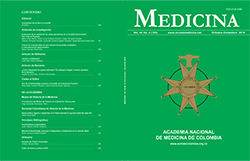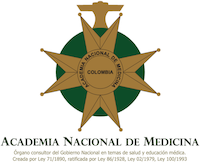EVALUACIÓN DE LA CALIDAD DE LAS NOTAS OPERATORIAS EN EL HOSPITAL UNIVERSITARIO SAN JOSÉ DE POPAYÁN
Palabras clave:
Notas operatorias, Notas quirúrgicas, CalidadResumen
Introducción: Las Notas Operatorias representan el elemento esencial en la documentación de un procedimiento quirúrgico con implicaciones en diversos ámbitos. Objetivos: El objetivo principal fue determinar la calidad de las Notas Operatorias en el Hospital Universitario San José de Popayán (HUSJ) durante el año 2015, así como los errores de mayor frecuencia en su diligenciamiento y las especialidades quirúrgicas con la menor calidad en el registro de sus notas. Materiales y métodos: Se realizó un estudio descriptivo de tipo corte transversal en una muestra tomada del total de notas operatorias de procedimientos realizados en el HUSJ durante el año 2015 a pacientes mayores de 18 años. Para la recolección de los datos se utilizó el instrumento elaborado por The Royal College of Surgeons de Inglaterra. Se consideró la calidad de las notas operatorias como deficiente, buena o excelente de acuerdo a los porcentajes de cumplimiento de los ítems evaluados en el instrumento, así: <74,99%, 75-94,99% y >95% respectivamente. Resultados: Se tomó una muestra de 373 Notas Operatorias, de las cuales la mayoría correspondieron a las especialidades de cirugía general, cirugía plástica y ortopedia/traumatología. Solo el 10,75% correspondieron a notas de excelente calidad. Las instrucciones de cuidados postoperatorios, la técnica de sutura y el tipo de incisión, fueron los ítems con más errores en su diligenciamiento. Las Notas de menor calificación fueron las de dermatología y ortopedia/traumatología. Conclusión: Los hallazgos de este estudio son similares a los encontrados en la literatura mundial. Pese a que la calidad de las notas operatorias es en promedio buena, quedan muchos ítems por mejorar.
Biografía del autor/a
Bairon Díaz Idrobo, Universidad del Cauca
MD. Universidad del Cauca. Popayán, Colombia.
Sarah Lucía Collazos Quintero, Universidad del Cauca
MD. Universidad del Cauca. Popayán, Colombia.
Diego Fernando Dorado, Universidad del Cauca
MD. Universidad del Cauca. Popayán, Colombia.
Jheison Fernando Dorado, Universidad del Cauca
MD. Universidad del Cauca. Popayán, Colombia.
Laura del Carmen Fajardo Quevedo, Universidad del Cauca
MD. Universidad del Cauca. Popayán, Colombia.
Alexei Bernardo Rojas Díaz, Universidad del Cauca
MD. Especialista en Cirugía general. Docente Universidad del Cauca. Popayán, Colombia.
Referencias bibliográficas
2. Academy of medical royal colleges. A clinician’s guide to record standards - Part 1: why standardise the structure and content of medical records? London: Royal College of Physicians (RCP); 2008. https://www.rcoa.ac.uk/sites/ default/files/FPM-clinicians-guide1.pdf
3. Hamza AA, Abdalrahim HM, Idris SA, Ahmed OM. Evaluating the Operative Notes of Patients Undergoing Surgery at Omdurman Teaching Hospital, Sudan. Sch. J. App. Med. Sci., 2013; 1 (6): 668-672.
4. Tanvir H, Naveed H. Guidance on writing general surgical operation notes: a review of the literature. Int Surg J. 2015 Aug; 2 (3): 326-330. https://bit.ly/2JWSqmg
5. Muhammad URK, Saeed A, Muhammad SS, Maimoona A, Shafiqur R. Operative notes at surgical units of a Tertiary Care Hospital. Journal of Surgery Pakistan (International). January - March 2010; 15 (1): 57-9.
6. Royal College of Physicians (RCP). Evidence on the quality of medical note keeping: Guidance for use at appraisal and revalidation. London: Academy of medical royal colleges; April 2011. https://bit.ly/2z9Btkt
7. Black Country Partnership NHS Foundation Trust. Clinical Record Keeping Standards; April 2017. https://bit.ly/2DABMIN
8. Johari A, Zaidi NH, Bokhari RF, Altaf A. Effectiveness of teaching operation notes to surgical residents. Saudi Surg J [serial online] 2013 [cited 2018 Nov 12]; 1:8-12. Available from: http://www.saudisurgj.org/text.asp?2013/1/1/8/118144
9. Dukic I, Shaw G, Dukic M, Hussain M, Al-Buheissi S, Maraj B. A comparison of handwritten to computerised urological operative notes. Journal of Clinical Urology. 2010; 3 (1): 22-24. ISSN 1875-9742. https://doi.org/10.1016/j.bjmsu.2009.10.002
10. Cromwell P, Flood M, Connell EO, Khan W, Waldron R, Khan I, et al. POST-OP: A Strategy to Improve Clinical Documentation in the Early Postoperative Period. Journal of Surgical Education. 2018; Jul-Ago 75 (4): 957-963. ISSN 1931-7204, https://doi.org/10.1016/j.jsurg.2018.01.005
11. Shah PA, Badiani R, Davis BM, Kalairajah Y. Improving the quality of orthopaedic elective and trauma operative notes: A completed audit loop study. International Journal of Surgery Open. 2016; 3: 14-17. ISSN 2405-8572. https://doi.org/10.1016/j.ijso.2016.04.005
12. Rogers A, Bunting M, Atherstone A. The quality of operative notes at a general surgery unit. S Afr Med J. 2008 Sep; 98 (9): 726-8. https://bit.ly/2DyMKyw
13. Thomson DR, Baldwin MJ, Bellini MI, Silva MA. Improving the quality of operative notes for laparoscopic cholecystectomy: Assessing the impact of a standardized operation note proforma. International Journal of Surgery. 2016; 27: 17-20, ISSN 1743-9191. https://doi.org/10.1016/j.ijsu.2016.01.037
14. Ghani Y, Thakrar R, Kosuge D, Bates P. ‘Smart’ electronic operation notes in surgery: An innovative way to improve patient care. International Journal of Surgery. 2014; 12 (1): 30-32. ISSN 1743-9191. https://doi.org/10.1016/j.ijsu.2013.10.017
15. Stogryn S, Hardy K, Vergis A. Bariatric operative reporting: Quality assessment and perceptions among bariatric surgeons. Surgery for Obesity and Related Diseases. 2017; 13 (3): 429-435. ISSN 1550-7289. https://doi.org/10.1016/j.soard.2016.10.003
16. Brown ML, Quiñonez LG, Schaff HV. A Pilot Study of Electronic Cardiovascular Operative Notes: Qualitative Assessment and Challenges in Implementation. Journal of the American College of Surgeons. 2010 Feb; 210 (2): 178-184. ISSN 1072-7515. https://doi.org/10.1016/j.jamcollsurg.2009.10.009
17. Organización Mundial de la Salud (OMS). Lista OMS de verificación de la seguridad de la cirugía. Manual de aplicación (1ª edición), Alianza mundial para la seguridad del paciente. Ginebra: OMS; 2009. http://www.who.int/patientsafety/safesurgery/es/
Cómo citar
Descargas
Publicado
Número
Sección
Licencia
Copyright
ANM de Colombia
Los autores deben declarar revisión, validación y aprobación para publicación del manuscrito, además de la cesión de los derechos patrimoniales de publicación, mediante un documento que debe ser enviado antes de la aparición del escrito. Puede solicitar el formato a través del correo revistamedicina@anmdecolombia.org.co o descargarlo directamente Documento Garantías y cesión de derechos.docx
Copyright
ANM de Colombia
Authors must state that they reviewed, validated and approved the manuscript's publication. Moreover, they must sign a model release that should be sent.




